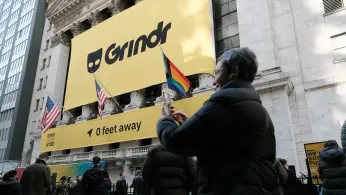
4 hours ago
Grindr Faces Major Buyout Offer as Investors Eye New Era for Tech Giant
READ TIME: 3 MIN.
Grindr, the West Hollywood-based company behind the internationally popular dating and social networking app for LGBTQ+ people, is at a critical juncture. On Friday, October 24, 2025, two major investors and board members, George Raymond Zage III and James Fu Bin Lu, made a buyout offer that would value the company at nearly $3.5 billion, signaling a potential shift in ownership and strategy for the digital giant .
Founded in 2009, Grindr rapidly became a household name in LGBTQ+ communities worldwide. Originally launched as a mobile dating application focused on gay and bisexual men, it has since expanded to serve lesbian, transgender, queer, and other gender-diverse users .
With nearly 15 million monthly active users, the platform is not only a leader in online dating but also serves as a space for friendship, professional networking, and information sharing, including travel tips and safety advice .
In 2022, Grindr made headlines by becoming a publicly traded company, a move celebrated as a milestone for LGBTQ+ representation in tech and business .
The buyout proposal, led by Zage and Lu, would pay shareholders $18 per share in cash—a 51% premium over Grindr’s stock price as of October 10, 2025 . Both investors are already deeply involved in Grindr’s operations: Lu is the chairperson of the board, and Zage is a board member. Together, their group of investors controls more than 60% of Grindr’s outstanding shares .
Debt and equity investors have also expressed interest in participating in the buyout, according to a news release from the investor group .
George Raymond Zage III stated that since acquiring the company in 2020, the investor group has focused on building a world-class management team and product improvements for the LGBTQ+ community Grindr serves .
Several factors are driving this move. First, the online dating sector is undergoing a generational shift. Gen Z users, who make up a growing portion of Grindr’s audience, are reportedly less interested in the “swipe culture” that has defined online dating for over a decade. Instead, they are seeking more in-person connections and meaningful interactions, challenging platforms like Grindr to adapt or risk losing relevance .
Additionally, LGBTQ+ digital spaces face increasing competition and evolving expectations around safety, inclusivity, and community engagement. For Grindr, going private could enable more flexibility and faster innovation, free from the scrutiny and short-term pressures of public markets .
Grindr’s potential move from public to private ownership is significant for the global LGBTQ+ community. As one of the most high-profile LGBTQ+-focused businesses, its leadership and business strategy have ripple effects throughout the technology industry and queer social networks .
The company has often been at the forefront of LGBTQ+ advocacy in the digital sphere, supporting Pride initiatives, HIV prevention campaigns, and offering safety features for users in countries where being LGBTQ+ is criminalized . Its next steps will be closely watched by activists, technologists, and business leaders alike.
Yet, Grindr has faced criticism and challenges, both internally and externally. Past controversies have included concerns about user privacy, data security, and the handling of sensitive personal information—issues that are especially acute for LGBTQ+ individuals in less accepting societies . Civil society organizations have called for increased transparency and accountability from technology companies serving vulnerable communities .
Moreover, the broader climate for LGBTQ+ inclusion in business has become more complex in recent years. While research shows that LGBTQ+ inclusive companies and cities experience higher economic performance and innovation, public support for corporate LGBTQ+ initiatives has declined, with a recent Ipsos Pride Survey showing only 41% global support for companies actively promoting LGBTQ+ equality . This contradiction highlights the tensions facing LGBTQ+-focused companies and their leaders.
If the buyout is accepted, Grindr could enter a new phase—potentially accelerating product innovation and community engagement away from the public eye. For LGBTQ+ users, the stakes are high: the platform remains a vital resource for connection, safety, and solidarity, especially in regions where LGBTQ+ rights are under threat .
The announcement also underscores the growing economic power and influence of LGBTQ+ businesses and entrepreneurs, even amid societal and political challenges . As Grindr’s future unfolds, its leadership will be judged not only by financial performance but by its ongoing commitment to serving and empowering LGBTQ+ people around the world.






